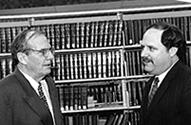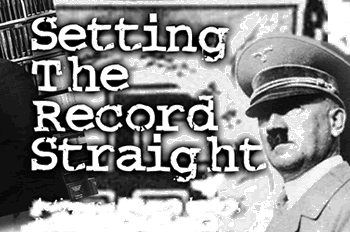


Cochran and Rychlak
If Pope Pius XII were alive today and on trial for accusations made against him for his actions during World War II, it might well be that University of Mississippi law professor Ronald Rychlak would step forward as his defense attorney.
Indeed, Rychlak culminated nine years of research in writing his book Hitler, The War, and the Pope, to be published in September by Genesis Press. The documented, historical account of Pope Pius XII contradicts the book Hitler's Pope by John Cornwell. Published last year by Viking Press, Cornwell's book accuses the Pope of being sympathetic with the Nazis; Rychlak, on the other hand, methodically defends the man who was elected to shepherd the Catholic Church only months before Hitler's invasion of Poland.
Almost mystical circumstances surround the timing of Rychlak's book about one of the most powerful churchmen in modern history: Cornwell's work-in-progress had been unknown to the law professor until his own research into the same subject was well underway; Pius XII is being considered for sainthood by the Roman Catholic Church; and Archbishop of New York John Cardinal O'Connor penned the book's foreword shortly before his death, including the following excerpt:
I am reminded of the words of Thomas Jefferson in his Notes on Virginia: "A patient pursuit of facts, and a cautious combination and comparison of them, is the drudgery to which man is subjected by his maker, if he wished to attain sure knowledge." Professor Rychlak has subjected himself to this drudgery of detail by patiently pursuing the facts. With due caution, he has combined and compared them for us so that we might attain knowledge of the part played by Pope Pius XII when darkness fell all around him. The portrait that emerges is one of an extraordinary pastor facing extremely vexing circumstances, of a holy man vying against an evil man, of a human being trying to save the lives of other human beings, of a light shining in the darkness.
|

Seeking the Facts Rychlak's quest to learn the truth about Pius XII began as the result of a conversation with his faculty colleague George Cochran. About nine years ago in the hallway of the University's Lamar Law Center, Rychlak recalls, "Cochran said, 'You know, the Pope was a Nazi'." Rychlak had never heard of the controversy surrounding Pius, he said, but a day or two later he went to the public library and found a book about Christian rescuers of Jews in Nazi-occupied Poland. "This, I thought, would tell me what had happened and let me discuss the issue with some knowledge." The account, however, raised more questions. "The book referred to the ambiguous leadership of Pope Pius XII and caused me to think that there might have been something to George's accusations. I needed to know more. "I had always wondered how Hitler could take over a society like Germany, and I wanted to learn more about the Nazi era, so I began reading all I could about Hitler, the war and the Pope." Quest Leads to Rome What Rychlak originally considered as a weekend, evening project began to evolve into something much bigger. It led the professor to numerous books at many libraries, other sources and translations, and finally to Rome and the Vatican archives -- the same records researched by Cornwell. "I had been working on my book of the same topic for several years when Cornwell's came out," said Rychlak. "I was able to look deeply into it (Cornwell's book), and as I did, it became apparent that Hitler's Pope was not a work of honest scholarship and was written to justify a conclusion that had been reached in advance." Rychlak traveled to Rome in December 1999 at the invitation of the Vatican. "They gave me an office on Vatican property, and I went through the archives, looking at the materials that Cornwell says left him in a state of moral shock," Rychlak said. "Everything I read, saw, every witness I spoke to was positive. I went to Cornwell's book, to the footnotes, to see where the bad stuff was. It turns out there was none. Cornwell's evidence simply does not back up his claims. There is no other way to put it." Evidence in Context About his own book, Rychlak emphasizes that it is not an attack on Cornwell; it's an evaluation of Pope Pius XII's wartime record, something others have tried to do before, as the professor explains in the book's preface: Many people have tried to evaluate Pope Pius XII's wartime record. Too often, however, the focus has been on individual episodes or limited periods of time. To evaluate properly his performance, one must begin by looking at all of the evidence in context. I did this by taking world events as we know them to have been and looking at Pius XII's actions, inactions, silence, and statements in the context of their time. Rychlak's book is laid out much like a legal argument. The first 17 chapters provide the factual background. "Here I use historical accounts, original documents and expert commentary to lay out the evidence," he said. The 18th chapter takes the evidence previously established and applies it to 10 questions typically raised regarding Pope Pius XII's behavior during the Holocaust. "This (the 18th chapter) is like a closing argument," Rychlak explained. "The epilogue is a direct rebuttal to the Hitler's Pope book. "Pius XII was a lawyer, and I think the way things are going, he needs a lawyer to make his case. The problem has been that people look at parts of the history out of context, and they draw wrong conclusions. When charges are rebutted, they shift to new charges. Those new charges can be rebutted, but soon the charges can mount up so much that readers (or jurors, if you will) are left with the feeling that there must be something to the charges. "I refused the defensive position except in the epilogue," Rychlak continued. "I made the affirmative case. Having done this, I think that I have presented a compelling case for 'my client'." Explaining the Myth So if in fact Pope Pius XII was not cozy with the Nazis, how could the myth have reached such monumental proportions? "Everyone, even Cornwell, acknowledges that the Pope undertook many initiatives to help Jewish victims of the Nazis," said Rychlak. However, following World War II, Communist propaganda dictated disregard for all religions, especially those of international proportions. "This propaganda spread to the West during the 1960s, fueled by the play The Deputy by Rolf Hocchuth, a fictional account promoting the idea that Pope Pius remained silent while Jews were being persecuted." The play came out about the same time as Adolph Eichmann's trial, Vatican II and publication of The Diary of Anne Frank. "Great attention spiced the myth, and it just took off," Rychlak said. Cornwell's book has drawn new attention to the subject, but Rychlak may well have the last word. According to Princeton University Professor Robert George, "Rychlak has buried the myth under an avalanche of facts .... [He] has done more than anyone else to set the record straight." |
Return to Spring 2000 Law Center News Magazine